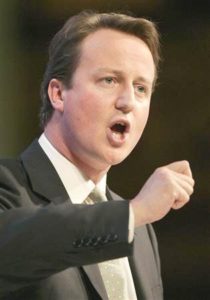 Victory for the British Tories came with a price. Several of Cameron’s front bench candidates for ministerial positions learned this the hard way, when they were informed they missed out on a cabinet position, in order to make room for their Liberal Democratic colleagues. The skipped over MPs are not alone in feeling that the price of government is high. The Euro-skeptic wing of the British Conservatives quickly noticed that Downing Street necessarily must, if not be europhile, at least be euro-pragmatic. The skeptics rapidly felt the first blows to their euro-skeptic aspirations.
Victory for the British Tories came with a price. Several of Cameron’s front bench candidates for ministerial positions learned this the hard way, when they were informed they missed out on a cabinet position, in order to make room for their Liberal Democratic colleagues. The skipped over MPs are not alone in feeling that the price of government is high. The Euro-skeptic wing of the British Conservatives quickly noticed that Downing Street necessarily must, if not be europhile, at least be euro-pragmatic. The skeptics rapidly felt the first blows to their euro-skeptic aspirations.
Firstly, the EU intends to forge ahead with the implementation of legislation intended to regulate hedge funds and private equity. As it so happens, 80 % of the European hedge funds are located in London. Undoubtedly, this was a factor in the UK government’s objections, and Cameron’s plea that his government needed more time to prepare for the initial hedge fund discussions. As the headlines of today (May 18) make clear, this was not acceptable for Cameron’s European counterparts. On the contrary, the German finance minister, Wolfgang Schaeuble echoed French and Spanish sentiments stating that “We are determined to accelerate the pace of regulation.” National finance ministers are now to negotiate with the European Parliament over the precise content of the legislation, before a final vote in mid July.
The draft law aims to put hedge funds and private equity under closer scrutiny by a new pan-European watchdog, which will be given the authority to cap their borrowing. Furthermore, it will oblige fund managers to register with national authorities and reveal to both regulators and investors information about their investments and borrowings. In addition, the law intends to make it more difficult for non-EU hedge funds to sell their products across the single market. The UK fears that EU regulation will drive hedge funds out of London and into cities such as Dubai, Zurich and New York City.
The second defeat on the EU-front for British euro-skeptics was the appointment of the “euro-realist” David Lidington as Europe minister. Lidington’s appointment, at the behest of strongly euro-skeptic David Francois, the Conservatives’ shadow Europe minister while in opposition, is viewed as a necessary concession with the pro-European Lib. Dems. The move has been denounced by some right-wingers, saying Lidington’s appointment will be the cause of “trouble” in the future. Indeed, as the an amendment to the Treaty of Lisbon (concerning the number of MEPs in the European Parliament) is due to be voted on in the British parliament within the next few weeks, “trouble” of some sort could be not to far off. Under any circumstance, prominent Tory euro-skeptic MP Douglas Carswell said he other skeptical MPs would attempt to force a referendum on the treaty in connection with the amendment. Although uncomfortable for Cameron, such a development seems unlikely. The Tories seem well on their way to adapting their European policies to the realities of being in power, regardless of the party’s skeptical members. The latest sign of the Conservative change of heart is foreign minister William Hagues about face on the pre-election plan to opt out of EU social and criminal legislation. While he was at it, the European diplomatic corps received Hagues endorsement, as did Council President Van Rompuys ideas on economic reform.
Although the new government seems to be setting a pragmatic European tack, the question remains as to whether pragmatism, rather than a wholehearted embrace of the EU, will suffice to carry the European experiment through the current crisis. For example, the British reaction to recent proposals for regulation of national parliament’s budgetary powers, could prove decisive. Considering the cool reception this proposal so far has been met with, euro-pragmatism does not seem to be a substitute for euro-enthusiasm.